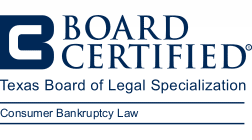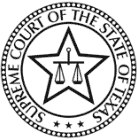Houston, TX Chapter 7 Bankruptcy Lawyer
Guidance from a Trusted Houston, TX Bankruptcy Attorney
Chapter 7 is sometimes referred to as "straight bankruptcy" or "liquidation." This is because, depending on your specific situation, a Chapter 7 bankruptcy discharges or "wipes out" all your unsecured debt in exchange for a liquidation of all your nonexempt property. Most people who file a Chapter 7 bankruptcy do not have nonexempt property to liquidate. Chapter 7 is a useful tool for consumers or corporations seeking to get a fresh start from unsecured debt. If you do not qualify for Chapter 7, Chapter 13 is a common alternative.
Specifically, Chapter 7 is effective in dealing with:
- Credit card debt
- Garnishments
- Judgments and lawsuits
- Creditor harassment
- Collection activity
- Medical bills
- Payday loans
- Personal loans
- Deficiencies from repossessions or foreclosures
- Co-signer debt liability
- Loss of license
- IRS liability
- Business liquidation or business debt
When bankruptcy is filed, an automatic stay is placed on all debts. This means creditors cannot seek payment during the process; must stop all collection activity, including lawsuits; and may not contact the debtor. Once the case is successfully completed, all dischargeable debts are discharged forever.
Determining Your Secured and Unsecured Debts Together
Generally speaking, a debt is secured if it was incurred to buy specific property in which the creditor retains an interest and can repossess or foreclose. Examples of secured debt include your house, vehicle, furniture, and appliances. These debts can often be reorganized in a Chapter 13 filing if you are behind on payments. Secured properties often may be kept in a Chapter 7 bankruptcy, if payments are kept current. However, you may also be able to surrender secured collateral and discharge any potential deficiency if that is in your best interest. This is something that we can help you determine.
Chapter 7 discharges your debts that are not secured, such as most credit card debt, personal loans, judgments, and medical bills, all while protecting your exempt assets such as houses, cars, and retirement accounts. Chapter 7 affords you the opportunity to make a clean start without the burden of bills.
Experience in Protecting Your Property With Exemptions
In Texas, Chapter 7 filers are allowed the option of choosing either federal or state property exemptions. Exemptions are property and assets that may be protected from seizure to pay creditors. Choosing the appropriate exemptions is a critical part of the bankruptcy process, so enlisting the help of an experienced bankruptcy attorney is highly recommended. Chapter 7 does not typically eliminate liens such as mortgages; some other debts including student loans, alimony and child support; or some types of tax debt.
Meeting Chapter 7 Requirements (With Guidance)
Those considering a Chapter 7 filing must qualify through a "means test" to determine if they have the means to pay their creditors. Anyone filing Chapter 7 must either fall below the state's median income for families or qualify under the "means test." In Texas, that median income currently ranges from $61,460 for a single person to $108,866 for a family of four.
This income is calculated from six months of income earned immediately before filing. Anyone above the median income may still be able to file for Chapter 7, but they must qualify under strict guidelines based on IRS standards. This is one of the many reasons to seek guidance from an experienced attorney who can guide you through the process.
Chapter 7 Bankruptcy FAQs
Answer: Yes, but only in cases where you qualify for Chapter 7, as determined by the means test mentioned above. If you do not qualify for Chapter 7, you will need to file under Chapter 13.
If you do qualify for Chapter 7 but have reservations about some of its requirements, you and your attorney can discuss whether Chapter 13 might be a better option for you. It is important to work with a highly qualified bankruptcy attorney who can explain pros and cons of each option you might choose.
Answer: A trustee is appointed by the bankruptcy court to oversee your case. Some of their duties include liquidating nonexempt assets to partially pay creditors and overseeing the creditor's meeting, which occurs about 30 days after filing. The trustee becomes sort of a liaison between you (the debtor) and any creditors who participate in the process.
I Have Heard That Filing for Bankruptcy Will Greatly Damage My Credit Score. What Effect Will a Chapter 7 Bankruptcy Have?
Answer: A Chapter 7 filing will remain on your credit report for 10 years, and it will likely cause a significant drop in your credit score. For a period of time after completing bankruptcy, you will likely have difficulty obtaining a loan or lines of credit (because you will be identified as a credit risk).
There are some things to keep in mind, however. First, if you have been in serious debt for a long time, chances are that your credit score was already damaged, and the benefits of bankruptcy likely outweigh any further damage to your score. Second, you can begin rebuilding your credit score almost right away. While the bankruptcy itself will stay on your record for a decade, your score can still improve with a pattern of responsible financial actions.
Contact Our Houston Chapter 7 Bankruptcy Attorney
If you or your business in Texas needs the assistance of an experienced and board-certified bankruptcy attorney, contact Vicky Fealy at The Fealy Law Firm, PC today. She will use her more than 25 years of experience to answer questions and provide guidance that will ensure you are taking the right steps toward debt relief. Call our Houston office at 713-526-5220 or complete our contact form to schedule your free consultation.
We are a debt relief agency. We help people file for bankruptcy relief under the Bankruptcy Code.












